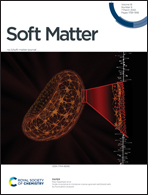Understanding slow compression and decompression of frictionless soft granular matter by network analysis†
Abstract
We consider dense granular systems in three spatial dimensions exposed to slow compression and decompression, below, during, above and well above jamming. The evolution of granular systems under slow deformation is non-trivial and involves smooth, continuous, reversible (de)compression periods, interrupted by fast, discontinuous, irreversible transition events. These events are often, but not always, associated with rearrangements of particles and of the contact network. How many particles are involved in these transitions between two states can range from few to almost all in the system. An analysis of the force network that is built on top of the contact network is carried out using the tools of persistent homology. Results involve the observation that kinetic energy is correlated with the intensity of rearrangements, while the evolution of global mechanical measures, such as pressure, is strongly correlated with the evolution of the topological measures quantifying loops in the force network. Surprisingly, some transitions are clearly detected by persistent homology even though motion/rearrangement of particles is much weaker, i.e., much harder to detect or, in some cases, not observed at all.



 Please wait while we load your content...
Please wait while we load your content...